跨文化交际Unit 4课件
- 格式:ppt
- 大小:3.64 MB
- 文档页数:15
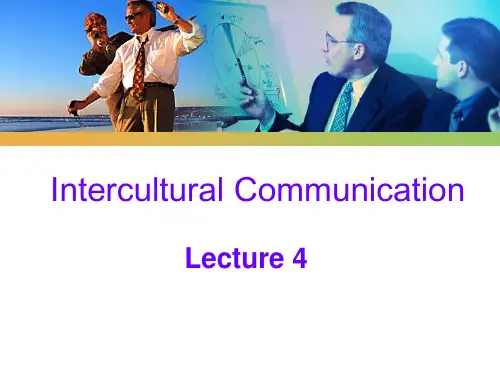
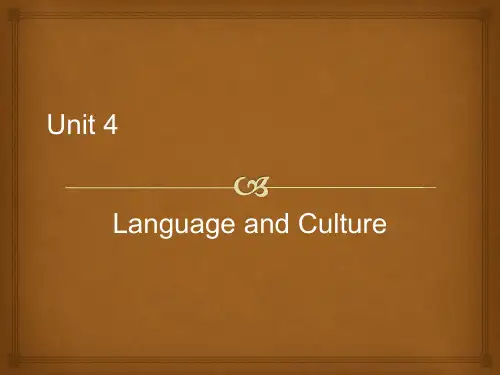
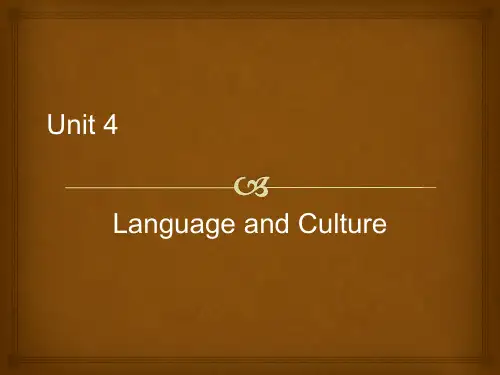
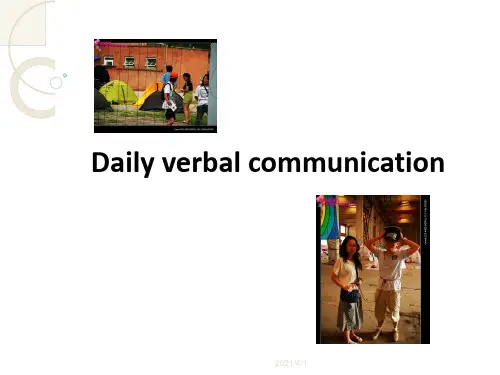
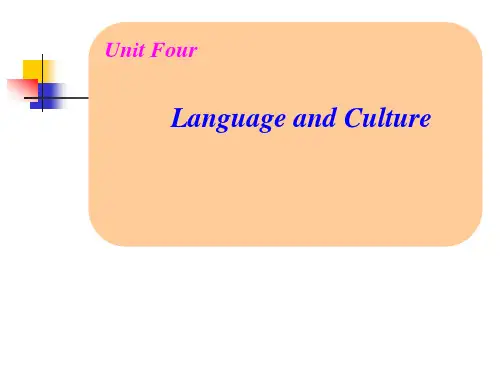
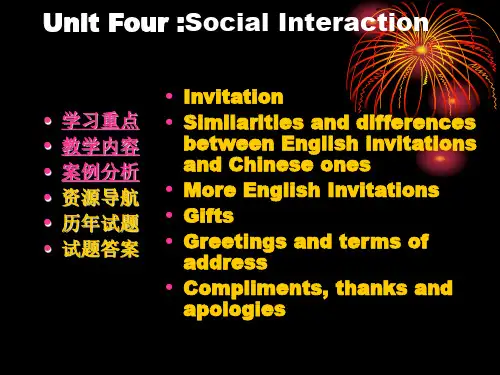
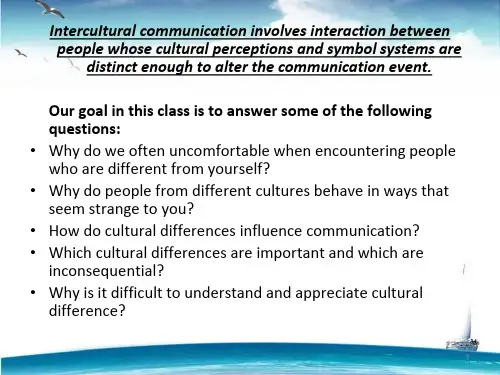
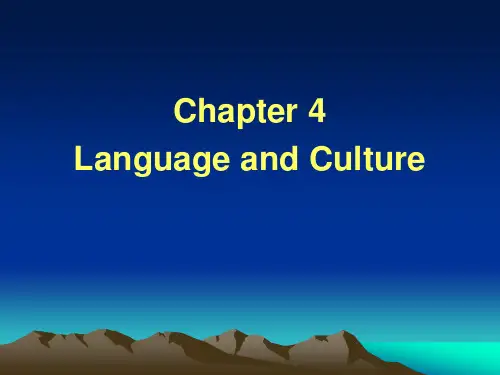


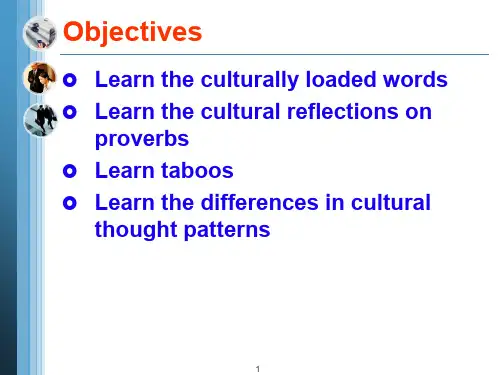
Unit 4 词汇与意义⏹教学内容:⏹(1)词汇的概念意义、内涵意义、社会意义、情感意义和搭配意义。
⏹(2)中英词汇对比⏹基本要求:⏹了解词汇在语言的跨文化交际中的地位,掌握词汇的几种意义,中英语言在词汇方面存在的差别。
重点是词汇的内涵意义及中英词汇的差别。
Importance⏹If we want to study the difference between two languages, we have to begin with the study of the words in the two languages. Because the close relationship between language and culture is most readily seen in words.Section 1 T ypes of meanings⏹1. Conceptual meaning概念意义⏹the basic meaning presented by a word. It refers to logical, cognitive(认知的), referential (指示的), or denotative(外延的)content.⏹also known as surface meaning or denotative meaning外延意义, dictionary meaning or literal meaning字面意义of a word.Features of Conceptual meaning概念意义⏹1. It is the core of the meaning of a word. It is the basic meaning represented by meaningful linguistic units. It‟s recorded in the dictionary.⏹E.g. woman-an adult female human being.⏹Dog-a four-legged animal which can make the sound of barking⏹2. It can be divided into some semantic components(语义成⏹分).⏹Woman: +animate(有生命) +human(人) - male (男性) -adult(成年)I⏹boy:⏹3. It is relatively constant and stable, because it is the meaning agreed upon by all the members of the same speech community.But it may also vary.⏹Manuscript =“手稿” now also including文稿printed from typewriter or computer Note: Many different words can have the same conceptual meaning⏹walk⏹to move forward by placing one foot in front of the other. The newlyweds新婚夫妇strolled down漫步the streets of Paris.⏹The wealthy businessman swaggered大摇大摆地into the restaurant and demanded a table.The overweight man lumbered笨重地行动along, breathing heavily and occasionally tripping.⏹These synonyms, although with different connotative meanings内涵意义, have the same conceptual meaning.The English Words unique in English culture⏹A. words related with geography⏹e.g. New England, Canberra, Northern Ireland, Sydney, London, Edinburgh, Greenwich, Quebec, Ottawa,⏹The Thames River, St. Lawrence, British Isles, The Rocky Mountains(落基山脉), The Mississippi River, The Niagara Falls,⏹koala, kangaroo, tornado(龙卷风)⏹The Great Barrier Reef, Silicon V alley, Yellowstone Park,⏹Summary:All these have their own geographical features: places, plants and animals uniquely found in USA, Great Britain and Australia; They all represent meaning unique in their own cultures;Their Chinese equivalents are only used by the Chinese people as mere names, which have lost their distinctive geographical and cultural features.The English Words unique in English culture⏹A. words related with geography⏹e.g.⏹U.S.A: New England, The Rocky Mountains,The Mississippi River, The Niagara Falls,Y ellowstone Park, Silicon V alley⏹Britain: British Isles, Northern Ireland, London, Edinburgh, Greenwich, The Thames River, Rose⏹Canada: Ottawa, Quebec, St. Lawrence,⏹Australia: Canberra, Sydney, The Great Barrier Reef, koala, kangaroo⏹B. words and history⏹the May Flower⏹(the ship in which a group of⏹British Puritans who were also⏹known as pilgrim fathers sailed to⏹America in 1620.⏹The revolutionary war⏹( the struggle of the 13 colonies in North America for independence from the British rule between 1775-1783)⏹Scalp(头皮)⏹(to tear the skin on the top and back of head and the hair attached from an enemy by an North American Indian as a trophy战利品)⏹⏹Knight⏹(a man given the rank of knighthood by the British Monarch in recognition of merits in public service)⏹Hippy/Hippie⏹(a young man and young woman who rejects authority, existing institutions and conventional attitudes towards morality, style of dress, etc.)⏹C. word and politics⏹USA: President, Secretary, Congress, Senate, the House of Representatives, The Democratic Party, The Republican Party, the Supreme Court⏹Great Britain: Parliament议会:the supreme legislative body of the United Kingdom. It comprises the sovereign, the House of Lords and the House of Commons.议会两院尤指英国由上议院和下议院构成的国家立法机关; Prime Minister, The Conservative Party, The Labour Party, Supreme Court of Judicature司法⏹Governor行政长官⏹the official title of the representative of the British monarch in a British colony.⏹Governor general总督⏹the personal representative of the British crown in the independent nations of the commonwealth.⏹e.g. The Canadian Governor General⏹Constitutional monarchy君主立宪制⏹a monarchy in which the powers of the rulers are restricted to those granted under the constitution and laws of the nationD. words and religion⏹Bible⏹a collection of religious books comprising the Old Testament and New Testament⏹reformation:宗教改革⏹a 16th century religious movement against the abuses in the Roman Catholic Church, ending in the formation of Protestant Churches.⏹Christmas box耶诞礼物或礼金⏹money given at Christmas time to the dustmen and others who provide a service throughout the year.⏹Boxing day节礼日⏹the first week day after Christmas, a legal holiday in England⏹Easter⏹the chief Christian feast, which celebrates the Resurrection of Christ, on the first Sunday after the full moon that coincides with or comes after the spring equinox.E. words and HolidaysChristmas cake/pudding/card/tree/carol/stockingFather Christmas), Santa Claus(A)⏹F. words and currency⏹Pound, penny; the American dollar, cent, quarter, nickel⏹G. Words and law⏹Court, judge, jury, lawyer, attorney (A)⏹H. Words and way of life⏹Snack Bar, roast beef, hamburger, sandwich, barbecue, cocktail, champagne; pajamas, suite, dress; subway, Greyhound bus; drive-ins, diner,⏹I. words and sports⏹Football, soccer, rugby, hockey, cricket⏹J. words and sex⏹Striptease, sex store, sexual interference, prostitute, whorehouse⏹K. words and personality⏹GB: reserve, practical, insularism偏执⏹USA:individualism, rapid pace of life, direct, promptness, informality, originality, materialism English works partly corresponding with Chinese words in conceptual meaning⏹1. Intellectual--知识分子⏹2. social sciences--社会科学⏹3. drugstore--药店⏹[美]杂货店(出售药物、糖果、饮料,化妆品,杂志及其他杂物的店铺)⏹4. Morning=午夜+凌晨+黎明+早晨+上午⏹5. Y oung(18-40), middle-aged(40-60), old (over 60)-------老中青⏹Discussion: discuss the conceptual differences between the words in each pair⏹yard--院子⏹peasant--农民⏹idealist-唯心主义者⏹materialist--唯物主义者"family" and jiating (家庭)⏹An American (A) attended her Chinese friend's (B) wedding. Two years later, the two met again.⏹A: Have you started a family'!⏹B: Oh, yes. Y ou attended my wedding, remember?⏹A: I mean if you've had children.⏹Here we see that ' family' means more than jiating (家庭) ,though they seem to be equivalents.2. Connotative meaning内涵意义⏹the implication(含义,暗示)of words, apart from its primary meaning.It is the communicative value that an expression has in addition to the purely conceptual meaning. It varies from culture to culture and from individual to individual⏹E.g. Woman⏹Physical: biped(双足的), having a womb(子宫)⏹Personality: gentle, compassionate, sensitive, hard-working, frail脆弱的, emotional, prone to tears, irrational, inconstant变化无常的,subject to maternal instinct, behavior: capable of speech, experienced in cookery, skirt or dress wearing,⏹Dog⏹loyal to owner, fierce凶猛的, violentFeatures of Connotative meaning内涵意义⏹1. Despite cultural background difference, some corresponding words in two languages may convey the same connotative meaning. e.g tiger, 老虎--cruelty⏹E.g. Woman⏹2. words with the same conceptual meaning yet different connotative meaning⏹书, book⏹老,old⏹同志,comrade⏹宣传,propaganda⏹狗,dogConnotative meanings vary according to different people, times, ages, societies etc.⏹E.g. Home: warm, loving, comfortable, safe⏹like a prison, cold, boring⏹终身大事⏹工作?事业?婚姻? 生死?⏹Connotative meaning may change with the times going⏹E.g. traditional: positive in the past⏹―old, conservative‖ at present⏹3. Social meaning社会意义⏹Social meaning is what a piece of language conveys about the social circumstances of its use, such as the language users( who are using the language), settings (where is language used), topics (what are language users are talking or writing).⏹E.g⏹home (general) , residence (formal), domicile(law), abode (literature),⏹horse, steed(战马), nag(老马),gee-gee(child)⏹throw(general) , cast (literature and religious), chuck(slang)⏹salt, sodium chloride⏹disobedient, recalcitrant反抗的⏹A good selection of words is important.Exercise!⏹Words which stand for what people do in order to make a living: job, vocation, profession, occupation, career, trade, work⏹Profession (an occupation requiring special education, especially in the liberal arts or sciences)所指的职业是需要在文科或理科方面有一定的教育程度,具备一定理论水平的人才的职业。